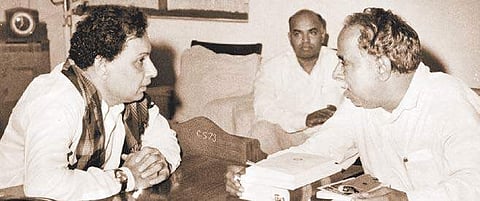

CHENNAI: It was 1973, just a year into the formation of the fledgling Anna Dravida Munnetra Kazhagam. Matinee icon MG Ramachandran, who floated the party after his tiff with DMK leader and Chief Minister M Karunanidhi, had just returned from his visit to the Soviet Union, where the empire was built on communist principles.
What emerged from this was a policy document for the nascent party, the now-forgotten Annaism.It was based on the principles advocated by DMK founder and his mentor, former chief minister CN Annadurai.
The new ideology was unveiled at a hurriedly-convened press meet on September 29, 1973, during which MGR released the 29-page policy document. When reporters sought clarity, Ramachandran said Annaism was a blend of the fine aspects of Gandhism, communism and capitalism, which would be strictly implemented within the party.
The policy was prepared by a committee of 75 members including party legislators and experts, said Saidai S Duraisamy, former Chennai city mayor and one of the founder members of the AIADMK, who republished Annaism recently in connection with MGR’s centenary celebrations.
Duraisamy, who was present on the day the policy was released, said Nanjil K Manoharan, RM Veerappan, SR Radha, ‘Alandur’ Mohanarangam and KA Krishnaswamy were among the key persons who gave shape to the policy.
Some Left leaders were also consulted in this process, Duraisamy added.
Despite advocating many lofty principles, the policy document attracted more brickbats than bouquets. Noted playwright and satirist Cho S Ramaswamy ridiculed the policy in the Sivaji Ganesan-starrer Thanga Pathakkam in which Cho had donned the role of a politician. He called Annaism as Appaism (Anna means elder brother and Appa means father), to poke fun at the policy.
The policy had many radical points to raise, including the right to recall people’s representatives when they fail to discharge their duties properly — incidentally a proposal that has gathered wind in the recent days.
“In a democracy, people are the final authority. When the elected MLAs and MPs lose the confidence of the people who elected them, the people should be given the right to recall them,” the policy said, insisting that the Centre should bring in an amendment to the Constitution to ensure this.
After having come out of the party raising allegations of corruption against Karunanidhi, MGR was particular in stressing that aspect. Pointing out how only an incorruptible government could achieve the goals outlined in the document, it said those entrusted with the charge of running the administration should be selfless and incorruptible. It insisted on an impartial inquiry regardless of the profile of the accused. “There should be provision for confiscation of properties accumulated by the accused and their relatives,” it added.
On the economic front, the policy advocated that the sale of all essential commodities should be taken over by the government. Like the ceiling on possession of land, there should be ceiling on income, too.
Interestingly, it also advocated demonetisation. “Above all, black money has been hanging on our economy like leprosy. Only if black money is released, we can save the country. The only way to do is to withdraw the currencies above `100. Through this, we can check the economic downtrend which is rushing to the lowest ebb at least temporarily,” the document said.
On the political front, the document said: “We want neither dependence nor independence but inter dependence.” Pointing out that the Constitution had not reflected on complete aspects of federalism, it calls for decentralisation of powers.
On the language issue, the policy said the local language should be the official language and English should be link language between Centre and State governments. The party would oppose all reasons for saying that Hindi alone would be the official language. The party would demand inclusion of English in the eighth schedule of the Constitution to safeguard the interests of the Anglo-Indian community.
"Panchayat presidents and municipal chairman should be directly elected by the people and cinema theatres within the limits of panchayats should be owned by the panchayats," it added.
Annaism aimed high, but was soon forgotten in the later decades. Years down the line, there are not many who have even heard of such an ideology.
In a nutshell